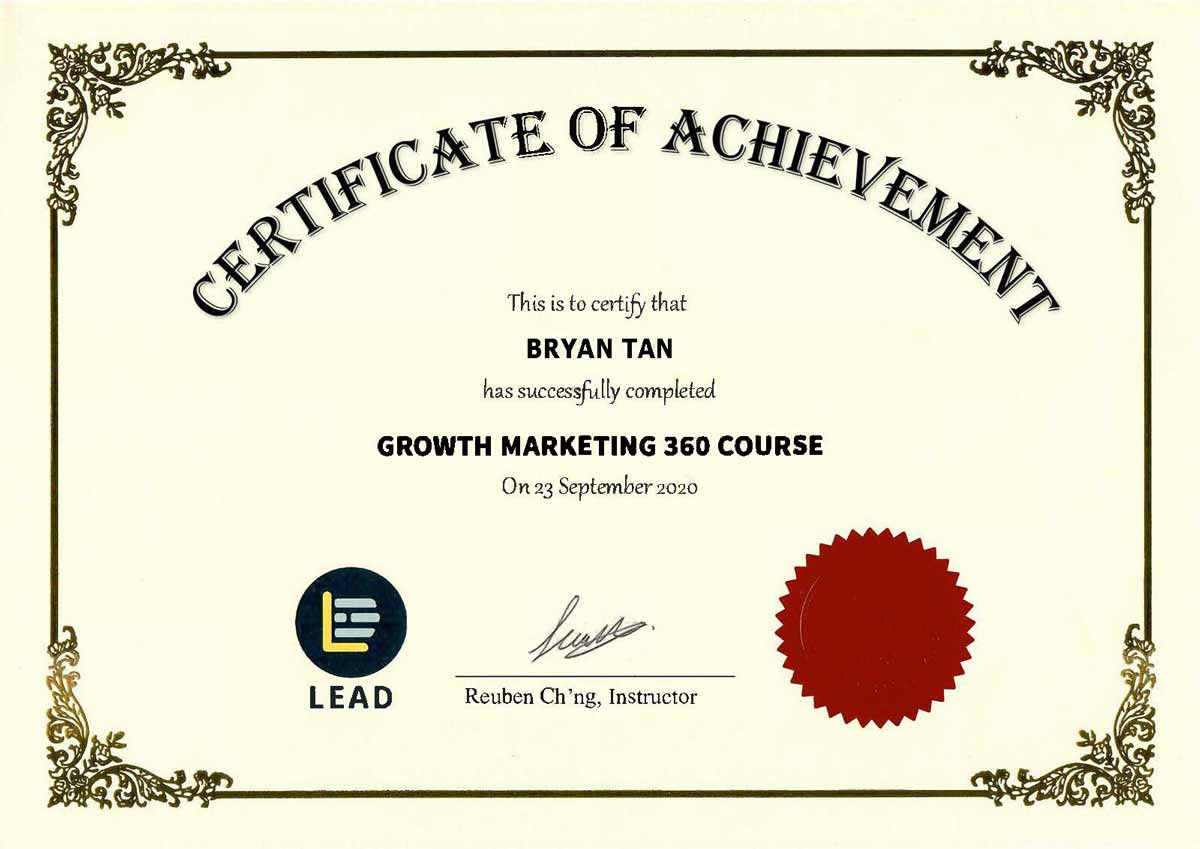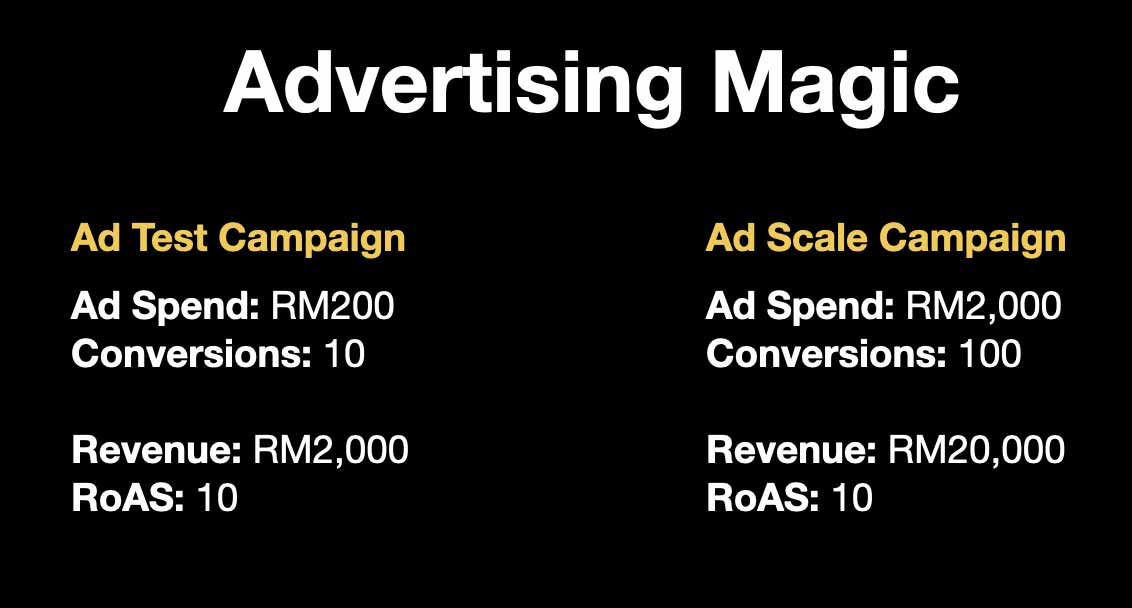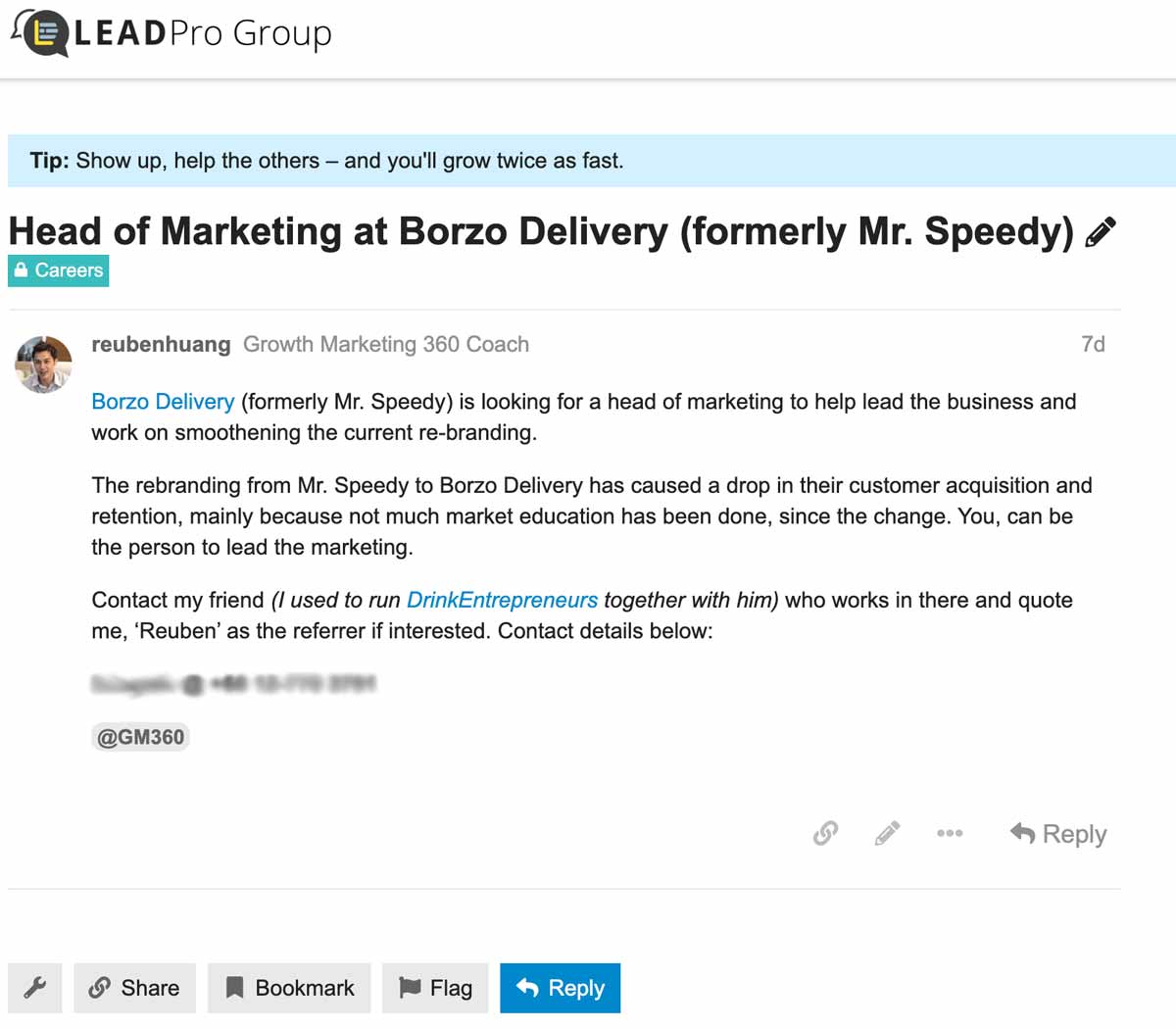Southeast Asia’s e-commerce market, especially in Malaysia, is growing fast. More businesses, small and large are using digital marketing to grow their business.
As someone who is interested to become a digital marketer, you probably want to know the best and fastest way to learn digital marketing.
This no-nonsense guide will walk you through everything you need to know about picking a digital marketing course in Malaysia.
Do you need a digital marketing certificate?

Certificate from Growth Marketing 360
Do businesses actually look at the certifications you have and then decide you’ll be the right person to who can help them grow?
Of course not.
Becoming a digital marketer is different from other professions like a doctor. You probably shouldn’t consult a doctor who learned to operate from YouTube.
But marketing is different. It’s often based on past performance and practical skillsets.
Businesses generally want to hire digital marketers who can grow their revenue. Having a certificate may look good, but your skillsets matter more.
Instead of having a digital marketing certificate, putting you in the same shoes as hundreds of other marketers, would it be possible to have:
- A reputation that far exceeds what a cert tells about you.
- Satisfied businesses whom you’ve helped, now ready to recommend you.
- A website or blog where potential employers can browse the projects you’ve worked on.
How to choose a digital marketing course.
If digital marketing is a career choice that is dependent on practical skill sets and track records, then the reason to join a digital marketing course is to get yourself into practicing marketing.

Here are some considerations to choosing a course:
1 – Know your goals and objective
What are you looking to get out of a digital marketing course?
Your goals could be:
- To use digital marketing for your business.
- To shift into a digital marketing career.
- To start your own digital marketing agency.
- Strengthen your marketing skillsets.
Once you clearly know your goals, see the objective and purpose of the digital marketing course you are interested in.
While many digital marketing courses focus on textbook lessons, tasking you to watch videos and learn up strange marketing jargon – sometimes, you just want to get straight to the point.
Can the digital marketing course help you do better marketing? Are the lessons based on practical case studies or is it academic-based?
2 – Consider the course syllabus
Most digital marketing courses in Malaysia embrace the typical textbook-style teaching. You’ll typically learn lessons that fall under digital marketing, such as:
- Search Engine Optimization (SEO)
- Paid Ads (Google, Facebook, Linkedin)
- Social media marketing
- Content marketing
- Web analytics
- Email marketing
- Marketing automation
- Influencer marketing
If that sounds like a lot, it is. The best digital marketers are people who have a diverse skillset, yet further on, they choose to specialize in a few selected skillsets.
But understand that a business does not necessarily need to use every available marketing strategy.
In marketing, we call this ‘shiny object syndrome’, where a business owner tends to jump from one marketing strategy to another, in hopes to find a quick win. But in doing so, failed to realize the potential of sticking to one marketing strategy.
Just because you can sign up for a Tik Tok account and start dancing to your audience, does not mean you have to.
So while it is appealing to choose a digital marketing course that promises to cover every subject that you’re interested in, consider that it’s equally, if not more important – to pick up solid marketing fundamentals.
The bottom line: Look for a digital marketing course that includes lessons on marketing fundamentals, and provides lots of real case studies.
3. Practical vs Theory
Ever came across a marketing theory that sounded good – and easy? Here’s an example:
And all you have to do is to spend RM200 on Google Ads and get back RM2,000 in sale conversions. That’s a 10X ROAS. Now, increase your ad spend to RM2,000 and get back RM20,000 in sales conversions. It’s like printing money!

Sorry, but advertising doesn’t work that way.
But any experienced digital marketer knows that only works in theory. When you apply digital marketing in real-world scenarios, the results are usually very different.
With paid ads, it’s possible that your ad creative will fatigue and no longer work as efficiently, as you scale your ad budgets.
The point is, with digital marketing, theory and practice are always different.
A good digital marketing course should provide plenty of real-world marketing case studies, so apart from only learning concepts and frameworks – you also see how what’s being taught are used in actual marketing work.
4. Work Opportunities
Does the digital marketing course provide you with working opportunities – either by offering a job placement/match or offering working gigs?
It may be worth looking for an institute or training provider who is actively providing their students with opportunities.

Job opportunities shared to students in the Growth Marketing 360 program
How long should a marketing course be?
You’ll find that different marketing courses have different study timelines. For example, taking up a Bachelor’s degree in Marketing will take up near four years in a university. At the same time, there are marketing bootcamps and short programs, which typically run over just a few weeks or months.
Choosing the right marketing course depends on your current priority and focus.
Have a full-time job and looking to upskill after work hours? A bootcamp-styled marketing course may suit you better.
Which marketing skillsets should I focus on?
Let’s briefly go through some skill set that you’d want to pick up as a digital marketer – whether you’re looking to start your own digital marketing agency, market your business or join a company.
1 – Search Engine Optimization (SEO)
SEO refers to the practice of influencing the ranking of a website, when searches are made on a search engine. People tend to trust what they find on search engines. That’s why businesses are rushing to get their sites ranked.
SEO is not dead. In fact, it’s more competitive than ever.
That also means it’s a highly profitable skill set. Some aspects of SEO you’ll need to learn are:
- On-page SEO: On-page SEO focuses on the contents existing on the page you’re optimizing for the search engines. With the proper keyword optimization, you can influence the search engine to show your page for certain search queries.
- Off-page SEO: This is SEO that focuses on everything happening outside your web pages – backlinks, guest posts, social sharing, etc. It’s achieved mainly by networking with influencers in your industry.
- Technical SEO: This type of SEO focuses on everything happening at the backend of your website – the coding, structured data, images, CSS file optimization. Technical SEO is focused on giving a good experience to the user.
2. Content Marketing
Content marketing is the act of creating and marketing valuable content, for the chance for your prospects to receive value and learn about how your business helps them.
Customers have more choices now than ever. And they want to do business with the companies they like and trust. Content marketing is one of the best ways to build likability and trust with customers.
It’s said that every company today is a content producer. Therefore, there is a growing need for content creators – whether you create written, video, or audio content.
Typical forms of content marketing to learn, include:
- Blogging: If you look closer, the internet is actually made up of content.
- eBooks and whitepapers: Think of eBook and whitepapers as a research paper or case study. They are effective for lead generation, where you collect a prospect’s information in exchange for their access to the research.
- Videos: With video consumption increasing every day, creating content in the form of videos makes an effective medium to deliver your message.
3. Social Media Marketing
Social media marketing is the practice of using social media platforms to market your service or product, by creating dialogues with your customers.
Most businesses make the costly mistake of selling to their customers on social media when they should be building a relationship. This is where the demand for social media marketers, comes.
Popular social media platforms to market on, include:
- Facebook: Depending on where and who you are marketing to, it’s quite likely that the people you want to reach are on Facebook.
- Twitter: Twitter is another social media platform that is used by a niche demographic in Malaysia.
- LinkedIn: Linkedin is a social media platform for professionals to connect and meet. The way to build dialogues on Linkedin is different from Facebook, as user behavior on the platform is different.
- Instagram: Best used for visual-appealing businesses, since Instagram is made up of mainly photos and videos.
4. Paid Advertising
It’s hard to think of a business today, that would not benefit from paid advertising.
This would refer to businesses advertising using ad networks such as Google Ads, Facebook Ads, and LinkedIn Ads for example. Digital paid advertising makes reaching audiences easy, as you could target literally anyone you want through interest, keywords, and contextual targeting.
But if it is so easy, then why do so many businesses end up losing money on paid advertising?
That’s because they do not have a paid advertising strategy. This is where marketers who specialize in paid advertising can come in to assist businesses with a strategy.
5. Email Marketing
Email marketing is a form of permission marketing that businesses use to communicate with their audiences. It requires a high level of copywriting skills – to create change, by prompting your audience to take action – such as purchasing a product or a service.
In most cases, businesses rely on email marketing to inform their audience about discounts, events, or to share useful content. You see E-commerce companies like Lazada and Shopee, rely heavily on emails to keep their audience updated about new deals.
However, before a business can start sending emails, they’ll need an email list.
As an email marketer, you come in to help businesses build an email list of relevant audiences and send emails that connect and enrich people. Because marketing is all about communicating value with people, skill sets like email marketing or instant messaging will always be relevant.
Bonus: How do I make money with digital marketing?
Generally, digital marketing is a profitable skill set. There are literally hundreds of ways to monetize from the skillset, and I’d like to share a few:
- Become a content marketer: Most businesses don’t have a content strategy. Charge businesses a retainer fee to create a strategy and manage the content marketing activities for them.
- SEO Specialist: Help businesses rank their website on Google and charge for your services.
- Social Media Marketer: Find businesses that are already active on social media and offer to take off the load from them, for a fee.
- Start your own marketing agency: Every company needs marketing help. Starting a marketing agency is a great way to offer marketing help.
- Become an affiliate marketer: With affiliate marketing, you don’t have to create a product or service. You simply market other people’s products.
- Get a digital marketing job: There are plenty of businesses willing to pay good salaries for marketers who can help them grow. And by the way, there’s nothing wrong with choosing to have a job compared to striking it out on your own.
- Monetize with ads: If you enjoy creating content, you can become a YouTube Partner or put up ads on your website.
Start your digital marketing journey today
The need for digital marketers is increasing. And with it, there are plenty of opportunities.

Sure, there are also more digital marketers than ever right now. So the way to thrive in the market is to stand out. What is the value you can bring to a company, that others are not so good at?
If you like to start your digital marketing journey on the right path, consider enrolling in our digital marketing program at LEAD. The program gets you to become a digital marketer by doing the work.


0 Comments